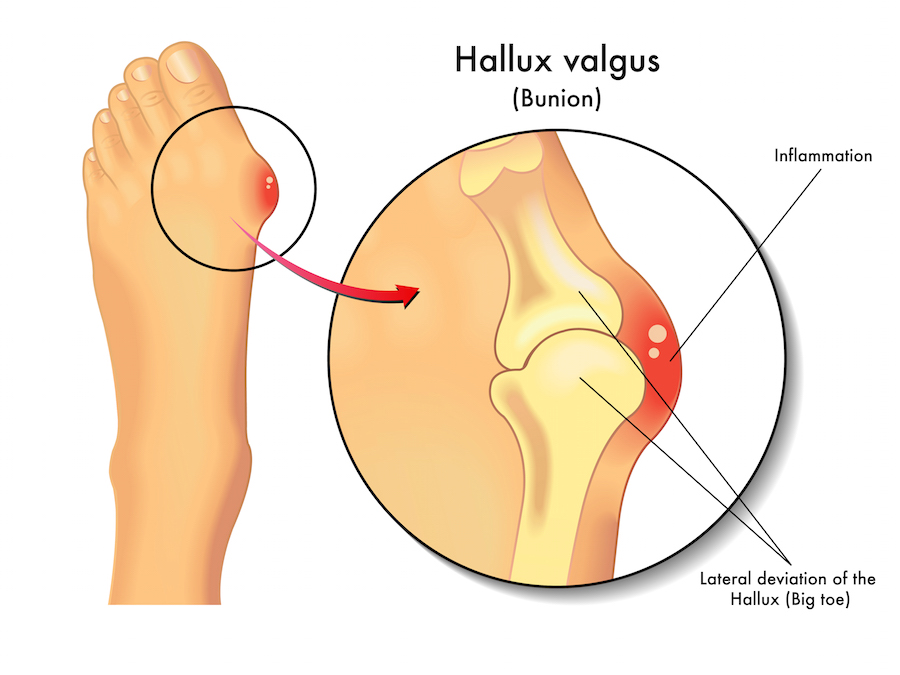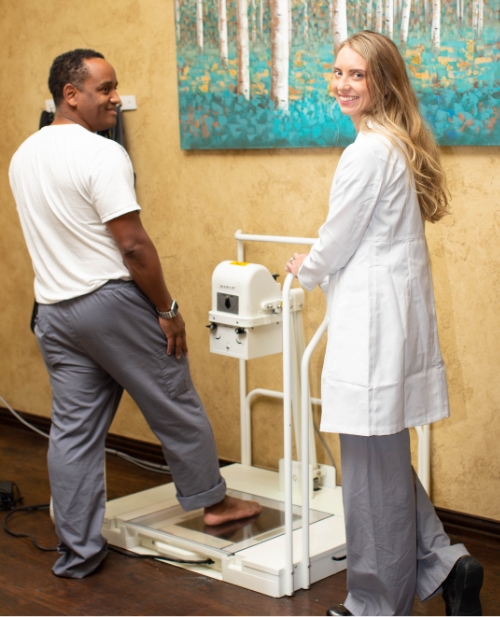
Bunions often appear as bumps or an enlarged growth on the side of your big toe. This is often because your big toe leans towards your second toe instead of pointing straight ahead. This forces your big toe joint in the opposite direction, away from the normal line of your foot.
Over time this growth can enlarge and cause additional pain and discomfort. Certain inherited foot types are prone to bunions due to the structure of the foot.
Causes of Bunions
Bunions can be caused by an inherited foot shape and structure that puts stress on your big toe. As your toe grows it leans towards your second toe, and the joint of the big toe enlarges. In addition to foot type, bunions can be caused by:
- Consistently wearing tight shoes that unnaturally push your toes together or put stress on the front of the foot (high heels).
- Medical conditions such as arthritis.
- Foot injuries can put stress on the front of the foot causing bunions.
Some of these problems can be prevented or alleviated by choosing shoes that support your feet and wearing customized orthotics to correctly position your feet.
Symptoms of Bunions
The most common symptom of bunions includes pain, soreness, inflammation and redness, burning sensations, and numbness in and around the front of your foot. Other symptoms may include:
- A large bump or bulge on the outside of your big toe.
- Swelling and redness on the joint of your big toe.
- Thickened skin on the base of your big toe or front of your foot.
- Restricted movement of your big toe.
- Pain when you walk.
- Persistent pain in and around your big toe, even when resting.
Treatment Options for Bunions in Frisco
Options for treatment may vary based on the length of time the bunion has been present and the severity of pain the bunion at the time of diagnosis. While treatment will vary from person to person, bunions are commonly treated by:
- Evaluating and changing the style of shoes you wear.
- Wearing arch supports, inserts, or custom orthotics.
- Padding and taping your foot to alleviate pressure and pain
- Taking medication to help control pain.
- Using prescription or orthotic devices to help with mobility.
These treatments are effective when your bunions are mild to moderate and can be performed at the RNV Podiatry office in Frisco, but Board Certified Dr. Verville may suggest surgical intervention if the problem becomes severe.
Bunion Surgery (Bunionectomy)
Depending on the severity of your condition and the cause, you may require surgical treatment such as a bunionectomy to effectively treat your condition. A bunionectomy involves:
- Removing the swollen tissue from around your big toe joint
- Straightening your big toe by removing part of the bone
- Realigning it with the long bone between the back part of your foot
- Permanently rejoining the bones.
A full recovery can take up to 8 weeks, but bunions may reappear if you continue to not take precautions.
How to Prevent Bunions
Once Dr. Verville has determined that the cause of your foot pain is a bunion and your treatment is complete, you can maintain the results by:
- Always wearing comfortable shoes that provide enough room for all toes.
- Getting your shoe size professionally measured to determine the correct size.
- Buying shoes with a wide toe box that provides additional space between your toes and the end of the shoe.
Shoe size and width often increase as we age, so be sure that you are wearing shoes that have ample space for your toes.
If you have painful bunions, call our Frisco office at (214) 385-8822 to find out how we can help.





